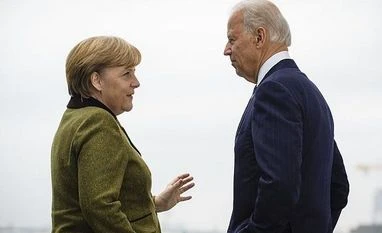Slowly but surely, the Mid-Atlantic Ridge keeps pushing the North American and European plates apart, at the rate of about an inch a year. Something similar is happening in geopolitical tectonics. One generation ago the U.S. was western Europe’s indispensable ally. Today, under President Donald Trump, it often looks more like Europe’s “foe” (Trump’s word) than friend.
That’s why Europeans, too, are waiting with bated breath for the U.S. presidential election next month. If Trump wins, the transatlantic rift will make another audible crack. If Joe Biden wins, the loudest sound will be the popping of champagne corks. But before long, Europeans will have to admit that the gradual estrangement continues no matter who’s in the White House.
Transatlantic relations started fraying long before Trump. They almost snapped during the administration of George W. Bush, before Barack Obama restored them a bit. Even that was largely cosmetic.
It was Obama, with Biden as vice president, who announced America’s strategic “pivot” to Asia, giving a name to a secular shift in orientation from the Atlantic to the Pacific. And previous U.S. presidents were already complaining — albeit politely — that the Europeans, and above all the Germans, were spending too little on their own armies to be dependable NATO allies, and free-riding on a global commercial system chaperoned by the U.S.
Trump simply blew the diplomatic sheen and subtlety off these disputes. Like no U.S. president since World War II, he shows disdain for European leaders such as German Chancellor Angela Merkel, even as he hobnobs with autocrats like Russian President Vladimir Putin. Trump doesn’t see “the West” as a community of liberal values and collective defense, which is why it appears to be dissolving.
In his trade wars, Trump made the European Union a bogeyman second only to China, imposing “national security” tariffs on European steel and aluminum, and more. In defense, he even cast doubt on his commitment to NATO. According to John Bolton, a former National Security Advisor, the president might quit the alliance in a second term, just as he has walked out of the Paris Agreement on climate change, the World Health Organization and other multilateral forums.
Trump has thereby erased all European assumptions about geopolitics. The American military and nuclear aegis has since World War II been western Europe’s best deterrent against aggression from Moscow. It also subsumed older intra-European rivalries, above all the one between Germany and France. In this way American power was a prerequisite of European integration. For Germans, the U.S. was almost a father figure.
These ties are probably broken beyond repair. Two in three Europeans have a negative view of the U.S. And Germans are split pretty equally on whether they want closer relations with the the Americans or the Chinese. Young voters prefer China. (See charts.)
So what is Europe’s Plan B if Trump wins a second term? “The response to America First is Europe United,” as Heiko Maas, Germany’s foreign minister, has bloviated. French President Emmanuel Macron likes to talk up “European sovereignty.” But nobody knows quite what that means. A “European army” remains a pipe dream. It’s hard enough to get the EU’s foreign ministers to speak with one voice on sanctions.
Maas is wrong that another Trump win would unify the EU. Instead, it’s more likely to divide the club further. Some of its members, especially those bordering Russia, would be happy to do bilateral deals with Trump to stay on his good side. The nationalist government in Warsaw, in particular, seems to prefer liaising with the White House to talking with Brussels, Berlin or Paris.
Biden, by contrast, is an avowed supporter of America’s alliances. He would reassure NATO and rejoin the Paris Agreement and the WHO. And he’s likely to work with the “E3” (Germany, France and the U.K.) to reengage Iran for an updated version of the nuclear deal abandoned by Trump. He will treat the Europeans as partners again.
Only up to a point, however. Biden may not withdraw U.S. troops from Germany, as Trump is planning. But he won’t invest in transatlantic defense either. That’s because every military dollar spent in Europe is one that’s unavailable in Asia.
Meanwhile, existing tensions wouldn’t disappear. Like his predecessor, Biden would try to stop a gas pipeline being built from Russia to Germany. He would keep leaning on the Germans and others to boost military spending. He would also insist that they actually use their armies in missions where the U.S. no longer sees its own interests at stake — in the eastern Mediterranean, perhaps, or Africa.
Above all, any president will expect America’s allies to stand with the U.S. against China. So the more the EU pursues its vague notion of “European sovereignty,” the less valuable for America it becomes. A Europe equidistant between East and West is of little interest to the U.S., and that in turn leaves the EU neither sovereign nor safe. Europeans should remember the underlying tectonics when they pop their champagne corks in November.
Unlock 30+ premium stories daily hand-picked by our editors, across devices on browser and app.
Pick your 5 favourite companies, get a daily email with all news updates on them.
Full access to our intuitive epaper - clip, save, share articles from any device; newspaper archives from 2006.
Preferential invites to Business Standard events.
Curated newsletters on markets, personal finance, policy & politics, start-ups, technology, and more.
)